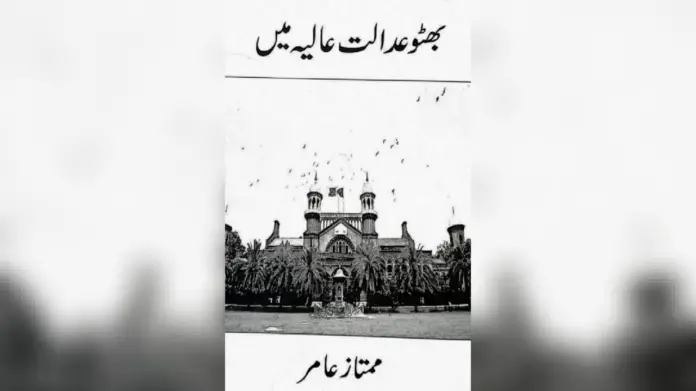Mumtaz Amir died recently this year in his ancestral city, Sadiqabad (Rahimyar Khan) where he was working as a practicing lawyer to eke out his living. He was seventy when he breathed his last, as he was afflicted with a terminal illness. While he was battling with his illness, he thought a lot about his years spent in Urdu journalism in Lahore, Karachi and other cities. After earning a degree in Journalism from Karachi University in 1973, Mumtaz Amir started his career from weekly Paiman, Karachi. He also worked for Wafaq, APP, Weekly Afro Asia Lahore, and Zindagi. There was an inner urge to piece together some of his writings which he had written for Urdu and English publications. He was dually helped by his family and so he managed to cull his reports filed as a sub-editor, weekly Zindagi, Lahore. He was also required to attend the court proceedings against the deposed Prime Minister Zulfikar Ali Bhutto (ZAB), the result being the book, Bhutto Adalat-e-Aalia Mein which brings back the memories of the tumultuous days which continue to haunt our country. Mumtaz Amir, who used to attend the court hearings whenever Bhutto appeared before the Lahore High Court, has compiled all the details in this book for the readers to have an idea of how things worked out.
The book starts from 13th September, 1977, when the author attended the first hearing in Lahore High Court. There the overall atmosphere looked tense as were most attendants who wanted to see Bhutto. Bhutto too looked uneasy and anguished as he sat with his lawyers Yahya Bakhtiar and M.D. Awan. Ch Zahoor Elahi was also sitting there and the author noted that someone made Ch. Zahoor Elahi sit right in front of Bhutto. Bhutto saw him and looked the other way. Bhutto was seeking his bail in the case of Nawab Muhammad Ahmad Khan’s murder case. Justice K.M.A Samdani and Mazharul Haq were the members of the jury who was vetting the appeal. There was jubilation when Justice Samdani granted him bail. Naturally, Bhutto and his supporters felt relieved for the time being. Their happiness was ephemeral as more cases were being opened against Bhutto at the behest of the powers that be. Mumtaz Amir reports that Bhutto felt exasperated on many occasions as he thought he was being cornered. He also reports that Ahmad Raza Kasuri leveled many allegations against Bhutto and accused him of killing his father as he had planned to teach them a lesson. Mumtaz Amir had it from Ahmad Raza Kasuri that when he opposed the decision of recognizing Bangladesh, they had developed many differences and the situation was such that Bhutto felt threatened. The author continued reporting till the case concluded as the Lahore High Court awarded death sentence to ZAB for abetment in the murder of Nawab Muhammad Ahmad Khan. Federal Security Forces and Masood Mehmood testified against Bhutto and many others turned approvers. The rest is history.
Although the author tries to remain neutral in reporting whatever he witnessed, at times he does lose his balance. Perhaps the far right ideology of the weekly Zindagi got the better of him. At one time, he remarks that very few people attended the court proceedings. At another point, he calls into question the ‘popularity’ of Bhutto as his party failed to organize powerful agitation in Lahore. The author seemed in a bit of a hurry to pass judgment as it was too early. History judges the achievements and failures of any political leader in a better way. Also, the author keeps mum about the sham trial and the way it was initiated against the popular leader whose only crime was giving voice to the millions of downtrodden and oppressed people of Pakistan. History rubbished the trial and execution of the former prime minister and many of the principal characters later recanted about their duplicity in the trial.
However, barring these issues, this slim book is a valuable addition to the scant political literature on one of the most crucial phases of our history. Mumtaz Amir also interviewed many prominent political leaders for Karachi weekly Paiman and his family intends to compile them into a book in the coming days. They are retrieving his writings from newspaper clippings and his diaries. All said and done, Bhutto Adalat-e-Aalia Mein should be a must read for students, academics, research scholars and laymen alike.







